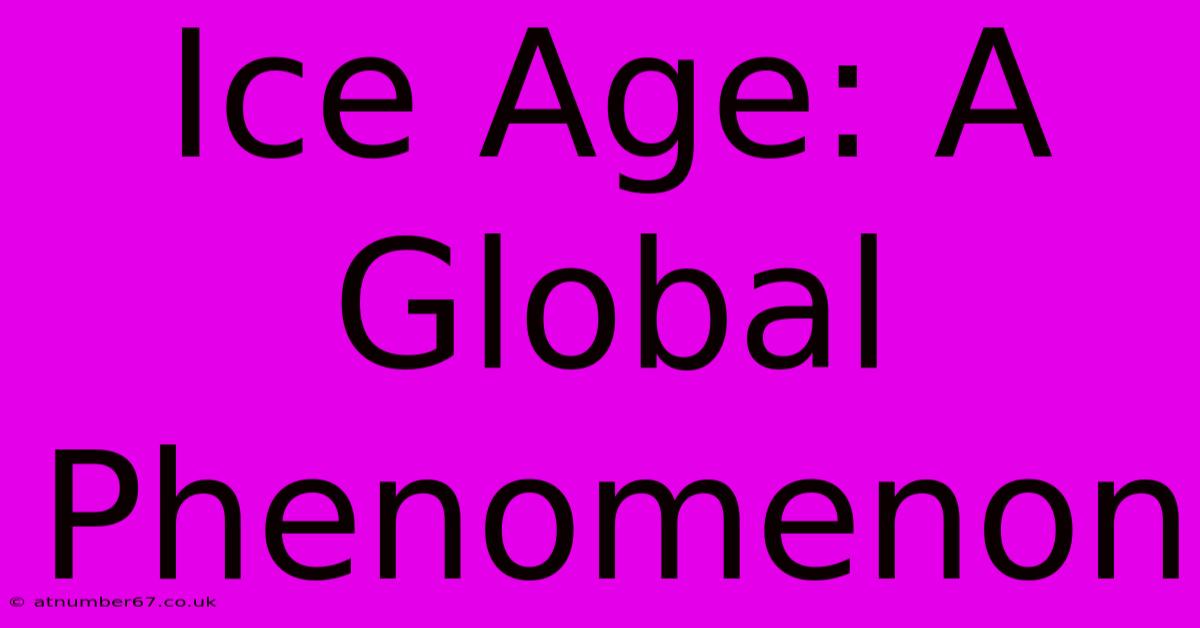Ice Age: A Global Phenomenon

Table of Contents
Ice Age: A Global Phenomenon
The Ice Age, a period of extensive glacial coverage across the Earth's surface, is far more than just a distant historical event. It's a powerful force that has shaped our planet's landscapes, influenced the evolution of life, and continues to subtly impact our world today. Understanding the Ice Age is key to understanding the Earth's dynamic climate and the potential consequences of future climate change.
What Exactly is an Ice Age?
An Ice Age isn't simply a period of cold weather. It's characterized by the presence of extensive ice sheets and glaciers covering significant portions of the continents. These massive ice sheets profoundly alter global sea levels, weather patterns, and ecosystems. Earth's history has seen multiple Ice Ages, with the most recent, the Quaternary glaciation, beginning approximately 2.6 million years ago and still technically ongoing today (though we're currently in an interglacial period—a warmer phase within an Ice Age).
Defining Glacial and Interglacial Periods
Within an Ice Age, there are fluctuations between glacial periods (ice advances) and interglacial periods (ice retreats). We currently reside in an interglacial period, the Holocene epoch, which began about 11,700 years ago. These shifts are driven by complex interactions within Earth's climate system, including variations in solar radiation, atmospheric composition, and ocean currents.
Causes of Ice Ages: A Complex Interplay
The precise causes of Ice Ages remain an area of active research, but several factors are believed to play crucial roles:
- Milankovitch Cycles: These are long-term variations in Earth's orbital parameters (eccentricity, obliquity, and precession) that influence the amount and distribution of solar radiation received by the planet. These cycles are considered a primary driver of glacial-interglacial cycles.
- Greenhouse Gas Concentrations: Variations in atmospheric greenhouse gas concentrations, such as carbon dioxide and methane, significantly impact the Earth's energy balance. Lower concentrations contribute to cooler temperatures and ice sheet expansion.
- Plate Tectonics: The movement of continents over millions of years can influence ocean currents and atmospheric circulation patterns, thus affecting global climate.
- Albedo Effect: Ice and snow have a high albedo, reflecting sunlight back into space. As ice sheets grow, this increased reflectivity leads to further cooling and ice expansion—a positive feedback loop.
The Impact of Ice Ages on Life and Landscapes
The Ice Ages have dramatically reshaped the Earth's geography and had a profound effect on the evolution of life.
Landscape Transformations:
- Glacial Carving: Massive glaciers carved out valleys, fjords, and other landforms we see today.
- Sea Level Changes: During glacial periods, vast amounts of water were locked up in ice sheets, causing global sea levels to drop significantly. Conversely, during interglacial periods, sea levels rise.
- Isostatic Rebound: The landmasses depressed by the weight of ice sheets slowly rebound upwards after the ice melts.
Biological Adaptations:
- Species Migration: Animals and plants migrated in response to changing climates and habitats.
- Evolutionary Pressures: Ice Ages acted as powerful selective pressures, driving the evolution of new species and adaptations to cold climates.
- Human Evolution: The Ice Ages played a significant role in the migration and evolution of early humans.
The Ice Age Today: A Continuing Legacy
Although we're in an interglacial period, the legacy of the Ice Age remains evident in our world. From the landscapes we inhabit to the distribution of species, the Ice Age has shaped our planet in profound ways. Understanding its mechanisms and impacts is vital for predicting and mitigating the effects of future climate change. The current warming trend raises concerns about accelerating the melting of glaciers and ice sheets, which would lead to significant sea-level rise and other far-reaching environmental consequences.
Conclusion:
The Ice Age is a captivating and complex subject with far-reaching implications. By studying past climate changes, we gain invaluable insights into the delicate balance of Earth's climate system and the potential consequences of human-induced climate change. Continued research into the Ice Age is crucial for understanding our planet's future.

Thank you for visiting our website wich cover about Ice Age: A Global Phenomenon. We hope the information provided has been useful to you. Feel free to contact us if you have any questions or need further assistance. See you next time and dont miss to bookmark.
Featured Posts
-
Unconditional Love My Mom
Apr 14, 2025
-
Tragedy Strikes Istanbuls Grand Bazaar
Apr 14, 2025
-
Free Fire Ka Dad The Perfect Sensitivity Guide
Apr 14, 2025
-
Millie Bobby Browns Age A Look Back
Apr 14, 2025
-
What You Dont Know About Charles Oakleys Money
Apr 14, 2025
